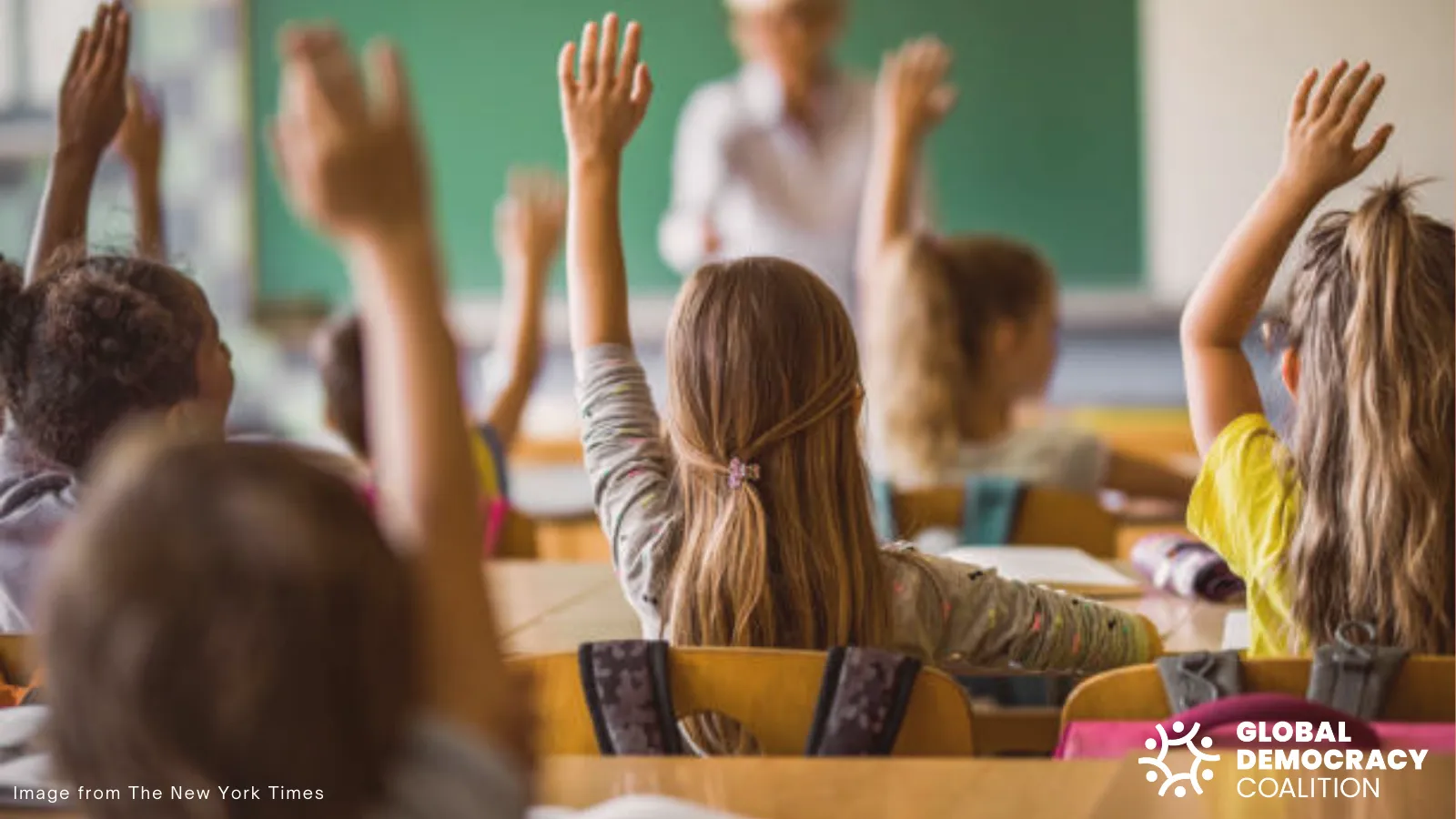The silent infrastructure of democracy: Why education matters

Education is not merely a tool for personal advancement but a fundamental pillar supporting the very fabric of democratic governance. This is a truth captured powerfully by Nigerian poet and novelist Chinua Achebe, who observed that “a functioning, robust democracy requires a healthy educated, participatory followership, and an educated, morally grounded leadership.”
Education and Civic Participation
A well-educated populace is the bedrock of a functioning democracy. Education equips individuals with the knowledge and critical thinking skills necessary to engage in informed decision-making and active civic participation. Studies have shown that individuals with higher levels of education are more likely to vote and participate in civic activities. For instance, a report by the Center for Information and Research on Civic Learning & Engagement (CIRCLE) highlights the positive correlation between educational attainment and voter turnout among young Americans.
The quality and content of civic education matter significantly. Research conducted in a global cross-section of countries indicates that rote memorization of civics facts does not effectively increase youth voter turnout. Instead, integrating practical information about the voting process and encouraging active engagement in civic matters prove more effective.
Education as a Catalyst for Informed Decision-Making
Democracy thrives when citizens can make informed choices. Education fosters critical thinking, enabling individuals to analyze information, discern facts from misinformation, and make decisions that align with their values and the common good. In an age where misinformation can spread rapidly, the ability to think critically is indispensable for maintaining the integrity of democratic processes. Carnegie Endowment for International Peace’s Countering Disinformation Effectively: An Evidence-Based Policy Guide shares that “aspects of media literacy have long been embedded in general education and liberal arts curricula in advanced democracies, especially in subjects that emphasize critical reading and thinking, such as language arts, essay writing, civics, and rhetoric.”
Likewise, several Global South nations are embedding critical thinking and media-literacy strategies into their educational approaches. In Ghana, teachers and curriculum experts are increasingly emphasizing inquiry-based learning, higher-order questioning, and digital literacy, recognizing that moving beyond rote memorization toward analysis, synthesis, and evaluation strengthens students’ abilities to question information and make reasoned judgments. In Peru, media-literacy initiatives such as Medios Claros have been actively training educators and integrating evidence-based frameworks (like the "Empowerment Spiral") into classrooms to help students deconstruct media messages and make informed decisions.
Reducing Crime Through Education
Education also plays a pivotal role in promoting social stability and reducing crime rates. Numerous studies have established a negative correlation between educational attainment and criminal activity. For example, research found that US students who attended better-funded schools were less likely to be arrested through age 30. Similarly, data from Sweden indicates that federally sentenced individuals with higher educational attainment had less extensive criminal histories compared to those with lower educational levels. Additionally, research on a group of Latin American countries demonstrates that an increase in school attendance can reduce crime and that schooling significantly reduces the probability of incarceration and arrest.
These findings underscore the importance of investing in education as a means of fostering safer communities and reducing the societal costs associated with crime.
Advancing Human Rights and Freedoms
Education is not only a powerful means of promoting human rights and fundamental freedoms, but is itself recognized in the Universal Declaration of Human Rights as a basic right (Article 26). The UDHR also asserts that education should be directed to the full development of the human personality and the strengthening of respect for human rights and fundamental freedoms. By educating individuals about their rights and the mechanisms to protect them, societies can empower citizens to advocate for themselves and others, leading to more equitable and just communities, which is one of the key points made in the National Democratic Institute’s Civic Education Program Guidance Report.
UNESCO's Recommendation on Education for Peace and Human Rights further emphasizes the role of education in fostering international understanding, cooperation, and peace. By integrating human rights education into curricula, societies can cultivate a culture of respect, tolerance, and active citizenship. To do so, the government of Australia is currently working on a human rights education requirement to be added to their national curricula. According to the Australian Human Rights Commission, these values will be “a concrete way to prevent bullying, discrimination and promote inclusion and respect for diversity.”
Fostering Tolerance and Peace
Education serves as a bridge between diverse communities, promoting tolerance and peaceful coexistence. Human rights education, in particular, encourages individuals to recognize the inherent dignity and rights of all people, regardless of differences. A study published by the Council of Europe highlights that human rights education fosters attitudes and behaviors needed to uphold human rights for all members of society.
By instilling values of empathy, understanding, and cooperation, education can mitigate prejudices and reduce societal tensions, paving the way for more harmonious communities.
The Imperative for Global Educational Investment
Despite the clear benefits of education for democratic societies, disparities in educational access and quality persist globally. For example, 42% of countries in Latin America have laws requiring children with disabilities to be educated in separate settings, and there are only five countries in the world that have inclusive education laws covering all learners. Additionally, research from The World Bank indicates that people in the 39 countries across the world get an average of just six years of schooling, three years fewer than those in other low- and middle-income countries. To build resilient democracies, it is imperative to prioritize education on a global scale. This includes not only ensuring access to primary and secondary education but also expanding opportunities for higher education and vocational training.
While education is a powerful driver of democratic resilience, its benefits are not automatic or guaranteed. In some contexts, education systems have been deliberately manipulated to undermine democratic norms and entrench authoritarian control. For example, during apartheid in South Africa, the Bantu Education Act enforced inferior, segregated schooling for Black South Africans to limit their social and political empowerment. Similarly, under Nazi Germany, education was used as a propaganda tool to indoctrinate youth with racist ideology and loyalty to the regime. The impact of education on democracy depends heavily on whether civic learning is inclusive, rights-based, and grounded in core democratic values such as equality, freedom, and respect for diversity. Without these foundations, education risks becoming a tool for social division rather than democratic empowerment.
Investing in education yields dividends beyond individual advancement; it strengthens democratic institutions, promotes economic development, and fosters social cohesion. Education should be at the forefront of policy agendas worldwide to nurture informed, engaged, and empowered citizens. From equipping citizens to discern truth in a world saturated with misinformation, to empowering the marginalized to claim their rights and participate fully in civic life, education shapes not only minds, but societies.
It is through education that democracy has the potential to become more than a structure of governance. A citizenry that can think critically, vote thoughtfully, engage respectfully, and advocate effectively is a potentially attainable outcome of sustained, inclusive, and well-supported education.
To build a democratic world that is just, resilient, and inclusive, global policy makers must urgently commit politically, economically, and morally to investing in inclusive, quality education that equips all citizens with the knowledge, critical thinking skills, and civic empowerment necessary to uphold and advance democracy. Anything less risks undermining the very foundations of democratic society.
Disclaimer: Opinions expressed in this commentary are those of the authors and do not necessarily represent the institutional position of International IDEA, its Board of Advisers or its Council of Member States.




